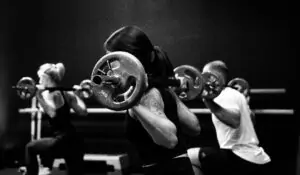If you were to do a survey at your local gym to see what type of supplements the majority were taking to give them an edge, you’d probably hear “creatine” come up a lot.
Creatine is one of the most popular supplements among those who are serious about their workouts and physique, and for good reason. It’s been proven time and again to be an effective, relatively safe supplement that can give its takers an energy boost and help them to work harder and more effectively in the gym.
Taking creatine is a little different than taking other sports supplements, though, so let’s talk a little bit about how it works and when you should be taking it for the best results.
How Creatine Works

Creatine is an amino acid that can help your muscles work harder, which can have a significant effect on the amount of weight you can lift and how long your workouts can last.
To get a little more technical, the majority of creatine is stored in your muscles as phosphocreatine. When you “fill up” your creatine stores with food and supplementation, phosphocreatine can help your body produce more energy, which your muscles can then use to power through your workout. [*]
Your body does produce some creatine naturally, and you can also get it in your diet from sources like meat and fish. These are in relatively small amounts when compared to creatine supplements, though, and it probably won’t fully fill up your phosphocreatine stores to the max. This is why so many athletes choose to add creatine to their supplement stack to maximize their energy and performance.
Benefits Of Creatine Supplementation
When you’re looking to increase your performance in the gym and build muscle at the same time, creatine supplements are a smart choice.
Performance: Because creatine plays such an important role in generating energy, it’s a great supplement for anyone who wants to work harder in the gym. When you fill up your phosphocreatine stores by taking a creatine supplement, your muscles have access to more energy and are therefore more equipped to handle your high-intensity, heavy workouts.
Creatine supplementation has also been shown to help increase muscle endurance, which can translate to a longer and more effective training session. [*] That means that you can spend more time in the gym working on building your strength!
Strength: Creatine helps your muscles work harder, which means that supplementation can play a serious role in helping build strength as well as your performance.
Take this study, for example: researchers gave creatine supplements to one group of athletes and a placebo supplement to another, then had them go through the same exercise routine for a month. After the four weeks were up, they found that the group that was given the creatine supplements showed a significant strength increase compared to the placebo group! [*]
Muscle Mass: Supplementing your diet with creatine can boost not only your performance, but the effects that your workout has on your physique as well. Creatine is commonly taken because it can help with hypertrophy – aka muscle gain. In fact, research shows that creatine is one of the most effective supplements you can take for increasing your lean mass. [*]
Creatine has its share of benefits outside of the gym too: its positive effect on muscle mass also makes it a good supplement for older adults to fight off the degeneration of muscle mass, strength, and fatigue that can come with aging. [*]
So whether you’re an athlete or just trying to preserve some muscle, the benefits of taking creatine supplementation are pretty obvious.
Should You Take Creatine Before or After A Workout?
As far as when you should be taking your creatine supplement in relation to a workout, though, the answer isn’t quite so clear.
Unlike some other sports nutrition supplements, creatine doesn’t have an immediate effect on your body as soon as you take it. In fact, it really only starts to have an effect on your performance and strength when you take it for a while and allow your phosphocreatine stores to build up in your muscles.
So it’s actually more important to be thinking about consistency rather than timing.
Some people choose to do a “loading phase” of creatine supplements because of this: they’ll take a higher dose of creatine every day for a short period of time (like a week) and then take “maintenance doses” around the time of their workouts to maintain their phosphocreatine levels. This keeps your phosphocreatine levels at their max, and only then does it really start to have an effect on your workout.
So since things don’t happen immediately, it doesn’t seem like there are huge benefits of taking your creatine dose either immediately before or following hitting the gym. That said, there is some evidence to suggest that taking your creatine after your workout might be slightly more advantageous for those who have body composition and muscle strength on their mind. [*]
The important thing is to make sure that, whether you’re doing it prior to or following, you’re taking creatine close to the time that you actually work out if you want to see improvements in body composition and performance. Waiting until much later or taking it way earlier in the day might minimize its effects. [*]
Key Takeaway
So, to sum it up: unlike other supplements such as pre-workout or protein powder that are more time-dependent, creatine only starts to have a meaningful effect on your energy and performance when you let it build up. It’s still important to take it around the time of your workouts, but there isn’t enough evidence to prove that pre- or post-workout supplement is better.
Either way, taking creatine consistently has a ton of benefits that’ll help you work harder and see more results in and out of the gym!
